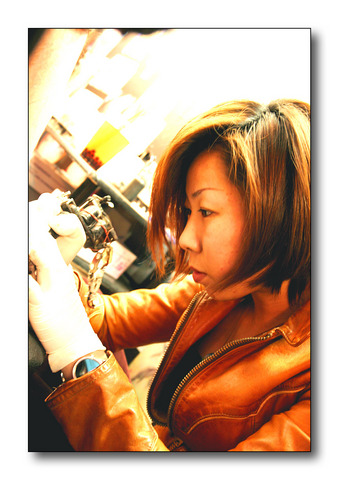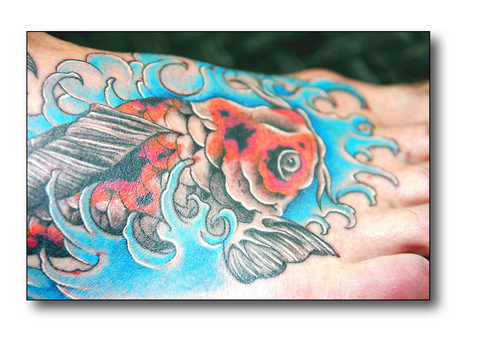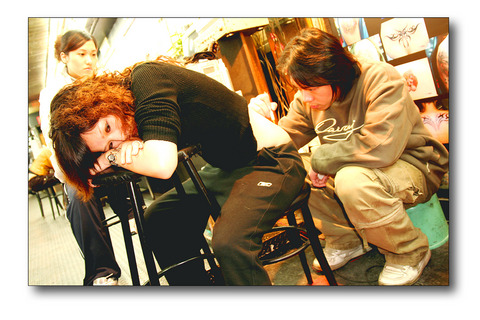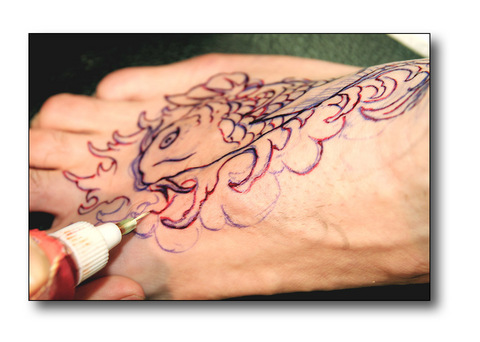It was business as usual at Kevin's tattoo shops in Ximending, Taipei. Akon's new album was on the beat box and muffled the steady buzz of drills. A young woman was bent over a chair and a tear slipped down her face as she had a design inked into her lower back. A friend comforted her. No pain, no gain.
On the parlor's walls were hundreds of graphic testaments to the popularity of tattoos. Smiling celebrities put their arms around Kevin's shoulder. Even politicians such as Ma Ying-jeou (馬英九) have given their tacit approval by agreeing to be photographed, grimacing, with the shaven-headed businessman, who dresses hip-hop style and exposes his tats.
Tattooing has come out of the closet and the reason is easy to see. Of the five people having tattoos last Sunday afternoon at Kevin's, three were women. Around 60 percent to 70 percent of his customers are female and it's the same story at other tattoo houses.

PHOTOS: JULES QUARTLY, TAIPEI TIMES
"It used to be guys, now it's girls, especially young women, even moms. Things have changed, modern women are more independent and can make their own minds up about tattoos. They're not against them," Kevin said.
"The younger generation's attitude is: 'This is me.' They're OK [about what people do with their bodies]. Older people, they see tattoos in NBA games, on showbiz programs and on the streets, so it's not a shock any more."
In fact tattoos have become so fashionable in the past seven years they're in danger of losing their bad-boy cachet. On the beach and in the clubs they're so ubiquitous the question for many young people is not, "why have a tattoo?" but "why not?"

Kevin got his first tattoo after completing military service. In the army tats are banned because of their gangster associations. He liked the NBA player Dennis Rodman and his elder sister copied the basketball player's tattoo and etched it into Kevin's skin. He was a deliveryman at the time.
"I didn't have any other skills, I wasn't earning much money and I didn't want to be 50 years old and have no house. You know the saying, 'five things to be successful' (五子登科). I wanted a wife, child, a car, house and gold. All I had was a talent for making pictures. I know everybody draws when they're young, but I was better and I practiced."
He opened up shop in Ximending and it was tough at first. Kevin said gangsters came round collecting protection money, the zeitgeist was against tattoos and business was slow.

"In those days people's attitudes were different. They didn't know whether having tattoos was right or wrong. The business was a risk. If it had failed I would have nothing. To succeed and be my own boss is great. Now I reckon I need `six things to be successful,' because I want a boat.'"
Kevin drives to work in a black Hummer H3, with decals of pirate skulls on the side. He employs 13 people and he's referred to as "teacher" or "master." He's often asked to judge tattoos at conventions and has become a tattooist to the stars, though he observes a "code of silence" about them and their tats. He often appears on showbiz programs and recently co-hosted Fun Taiwan (瘋台灣).
He stills plays pickup basketball with the lads and goes hunting in the mountains, but he's just as likely to play golf at a club and chat about his new villa in Sindian (新店), with its spa club and pool. Tattooing has arrived. It's no longer a mark of criminals, as it used to be in China. On the contrary, it's an assertion of individuality by the "me generation."

Ah Lu (江東儒) agreed. The exhibition organizer and advertising manager of the publication Tattoo said Taiwan has been the center of the Chinese tat trade for over 30 years and predicted it would get bigger as China opens up.
"Traditional tattoos are still number one," he said, but added Japanese influences are strong, as are styles from the West, including movies and beach culture. His favorite tattooist is Taipei County's Andy Shou (蕭時哲).
Shou also reckoned tattooing has become part of mainstream culture, but has a more artistic approach toward his craft. While Kevin explores fantasy images from Lord of the Rings in his new designs; Shou is inspired by classical figures and animals in Chinese history and mythology.
"My pictures are different from others because they are mine. They explore Chinese culture, local culture and other influences, but they must have deep meanings." He even pens poems to go with his pictures.
His work is incredibly detailed and therefore probably hurts more than most. Gods appear to devour the universe, eyes are rendered in intense detail, as are skin textures and beards. As the body moves, the pictures appear to change their aspects. It's no exaggeration to say the skin becomes a living canvas.
Man has always tattooed, but with modern instruments and new techniques it has reinvented itself here and around the world for the 21st century.
Dos and don'ts of tattooing
First of all, make sure the place you're going to have your tattoo done follows hygienic practices.
Seven years ago this was the first priority for Kevin and it's just as important now. The needles he uses come in sterile packages and are disposable. Ink is put in containers and thrown away after use. Most of his equipment is made in England by Mickey Sharpz and is sterilized before use. All tattooists should use latex gloves.
Currently, there's no association that oversees tattooists and their practices, so it is up to you ensure your own safety. Make enquiries, seek recommendations from people who have had tattoos and question your tattooist. If he or she is defensive about being questioned then be wary.
It's not wise to drink or do drugs in excess before getting a tattoo, though some individuals take the edge off as a way of coping with the discomfort. Having a tattoo is, in some ways, like going to the dentist. It's going to hurt but you should be able to cope. Scarifying the skin hurts more over bone and in sensitive areas, obviously.
Andy Shou said the important thing was not to regret having a tattoo, so think hard and long about it. Then research and go to a tattooist who has a good reputation and whose work you like. Shou said he discourages minors from having tattoos, people who are intoxicated and those who have not thought about what they want.
Kevin and his wife, Yu-chun (又淳), who is also a tattoo teacher, said it was important the customer had a clear idea of the tattoo he or she wanted. "If they don't know, it's not going to work," she said.
Tattoo aftercare is extremely important — a beautiful tattoo can be ruined if not cared for properly.
"Don't ask for something fashionable, like a picture of Michael Jordan, because you may regret it when it's out of fashion," Kevin said. "It's best to have your own idea and let us take care of the design."
As for having "I love XXX" tattooed above your heart, Kevin laughed and said this was good. "Of course. It means you're in love." Even so, it's wise to make sure this is the love of your life before having it done. Tattoos can be removed but it's a pain, and not just financially.
Unlike other tattoo houses Kevin does not use flashes (mass-produced designs), as he says your tattoo should be unique. "There's nothing worse than seeing all the same tattoos down the beach."
A friend can help take your mind off the needles and make sure you feel OK. Taking a break when you've had enough is a good idea. Though it's easier to say than do, try and relax. If you tense up it makes the experience more uncomfortable. It is mind over matter.
Finally, if you have doubts, try a temporary tattoo first.

On April 26, The Lancet published a letter from two doctors at Taichung-based China Medical University Hospital (CMUH) warning that “Taiwan’s Health Care System is on the Brink of Collapse.” The authors said that “Years of policy inaction and mismanagement of resources have led to the National Health Insurance system operating under unsustainable conditions.” The pushback was immediate. Errors in the paper were quickly identified and publicized, to discredit the authors (the hospital apologized). CNA reported that CMUH said the letter described Taiwan in 2021 as having 62 nurses per 10,000 people, when the correct number was 78 nurses per 10,000

As we live longer, our risk of cognitive impairment is increasing. How can we delay the onset of symptoms? Do we have to give up every indulgence or can small changes make a difference? We asked neurologists for tips on how to keep our brains healthy for life. TAKE CARE OF YOUR HEALTH “All of the sensible things that apply to bodily health apply to brain health,” says Suzanne O’Sullivan, a consultant in neurology at the National Hospital for Neurology and Neurosurgery in London, and the author of The Age of Diagnosis. “When you’re 20, you can get away with absolute

May 5 to May 11 What started out as friction between Taiwanese students at Taichung First High School and a Japanese head cook escalated dramatically over the first two weeks of May 1927. It began on April 30 when the cook’s wife knew that lotus starch used in that night’s dinner had rat feces in it, but failed to inform staff until the meal was already prepared. The students believed that her silence was intentional, and filed a complaint. The school’s Japanese administrators sided with the cook’s family, dismissing the students as troublemakers and clamping down on their freedoms — with

As Donald Trump’s executive order in March led to the shuttering of Voice of America (VOA) — the global broadcaster whose roots date back to the fight against Nazi propaganda — he quickly attracted support from figures not used to aligning themselves with any US administration. Trump had ordered the US Agency for Global Media, the federal agency that funds VOA and other groups promoting independent journalism overseas, to be “eliminated to the maximum extent consistent with applicable law.” The decision suddenly halted programming in 49 languages to more than 425 million people. In Moscow, Margarita Simonyan, the hardline editor-in-chief of the